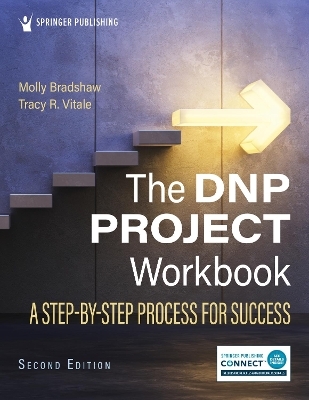
The DNP Project Workbook
Springer Publishing Co Inc (Verlag)
978-0-8261-7483-3 (ISBN)
This acclaimed workbook delivers an organized, systematic roadmap for the development, implementation, evaluation, and completion of the DNP Project. Designed by two nurse educators motivated by their own frustrating DNP experiences to help the next generation of students, it consists of a collection of lessons guiding readers, step-by-step, through the entire DNP Project process. Anchored in a real-world context with more than 100 learning activities, the resource promotes active learning and delivers practical tips and advice for every stage of the project. The improved second edition maps content to the new AACN essentials, reorganizes lessons for ease of use, weaves student project examples throughout chapters, adds new tables for quick reference, and offers additional supplemental content for students and faculty alike.
The workbook begins with fundamental, knowledge-based information and then addresses the development of the DNP Project team, the feasibility of project ideas, and the elements required to develop, implement, evaluate, disseminate, and complete the project. It provides a variety of in-depth examples from actual projects to document the development of ideas and a logical, critical thinking process. The format of individual lessons enables readers to complete them in the order that best mirrors the project requirements at all schools. Chapters begin with learning objectives and conclude with a concept map to summarize lessons learned. Also included are forms to help readers organize and document ideas, communicate with stakeholders, and track their progress. Purchase includes online access via most mobile devices or computers.
New to the Second Edition:
Maps content to the new AACN Essentials
Reorganizes lessons based on student/faculty feedback
Threads new student project exemplars throughout chapters
Provides new tables for speedy reference
Improves visual appeal and readability with two-color design
Offers enhanced supplemental information
Key Features:
Helps students to break down the complex DNP Project process into concrete and manageable steps
Facilitates application of core knowledge to develop required DNP competencies
Fosters development of creative thinking
Provides lessons targeting activities for independent study or in-classroom engagement
Helps students and teachers to document work to meet AACN competencies
Illustrates DNP concepts with quick reference tables and examples
Molly Bradshaw, DNP, APRN, FNP-BC, WHNP-BC, CP-C is the current owner and Chief Executive Officer for her company, DNPmollyB, LLC where she works as a consultant and educator. She maintains a full-time clinical practice at First Choice Immediate Care, in Columbia, Kentucky. She completed her undergraduate nursing degrees at Eastern Kentucky University (1998, 2001); got her master's degree at the University of Kentucky (2005); and earned her doctor of nursing practice degree at Rutgers, The State University of New Jersey (2016). She is nationally board certified as both a family and a women's health nurse practitioner, as well as a Veteran of the United States Navy. In the academic setting she has been a former associate professor, DNP program coordinator, and faculty innovator at Eastern Kentucky University, Richmond, Kentucky. Also, she has been full time faculty at Rutgers, the State University of New Jersey. Her academic scholarship is rooted in teaching innovation, use of infographics/social media, and the DNP Project. Her published works focus on clinical subjects such as prescribing habits of nurse practitioners and chronic disease management, including hypertension, chronic obstructive pulmonary disease, obesity, and multiple sclerosis. She is engaged in training and content creation for emerging Mobile Integrated Health (MIH) programs and Community Paramedics. Tracy R. Vitale, DNP, RNC-OB, C-EFM, NE-BC, has been a nurse for more than 20 years and is currently an associate professor and specialty director of DNP Projects/DNP Project courses at Rutgers, The State University of New Jersey School of Nursing, Newark, New Jersey. She received her baccalaureate degree in nursing from The College of New Jersey (2000), her master's in nursing from the University of Phoenix (2006), and a doctor of nursing practice degree from Rutgers, The State University of New Jersey (2016). Prior to transitioning to academia in 2017, her nursing career included leadership positions in maternal-fetal medicine research, outpatient private maternal-fetal medicine and high-risk obstetrics practice, and labor and delivery/perinatal evaluation and treatment departments. Dr. Vitale sits on the board of directors for the Organization of Nurse Leaders of New Jersey and is actively involved with the research committee. She also serves on the advisory council for the New Jersey Collaborating Center for Nursing, which focuses on nursing workforce issues and is the Region 4 Vice President of Policy and Practice for the New Jersey State Nurses Association. Dr. Vitale also serves as a manuscript reviewer for select journals.
Contributors
Foreword
Preface
Introduction
Resources
Chapter 1: Ground Zero: Professionalism & Personal Development
Lesson 1.1 Professional Competencies and Communication
Lesson 1.2 Writing a Professional Bio and Getting Professional Pictures
Lesson 1.3 Resume v Curriculum Vitae
Lesson 1.4 Assessment of Personal Learning & Leadership Style
Lesson 1.5 Developing Basic Technology Skills for the DNP Project
Lesson 1.6 Developing Writing Skills
Lesson 1.7 Time Management Strategies
Chapter 2: Understanding the DNP Degree and DNP Project
Lesson 2.1 Why Get a Terminal Degree?
Lesson 2.2 Nursing Degree v Nursing Role
Lesson 2.3 Understanding the AACN Essentials
Lesson 2.4 Comparing the DNP and PhD
Lesson 2.5 Evidence-Based Practice and Quality Improvement
Lesson 2.6 What is a DNP Project?
Lesson 2.7 Design Types of DNP Projects
Lesson 2.8 DNP Project Requirements At Your School
Lesson 2.9 Review of Completed DNP Projects
Lesson 2.10 The DNP Practice Experience & Practice Hours
Lesson 2.11 Group DNP Projects
Chapter 3: Identifying Problems and Project Topics
Lesson 3.1 Your Initial Ideas
Lesson 3.2 Identifying Global and National Problems
Lesson 3.3 Identifying State and Local Problems
Lesson 3.4 Problems With the Healthcare System, Information, and Technology
Lesson 3.5 Cognitive Walkthrough
Lesson 3.6 Networking to Identify and Discuss Problems
Lesson 3.7 Organizing Your Findings
Lesson 3.8 Selecting the Problem and Drafting the Problem Statement
Lesson 3.9 Writing a Problem Statement
Chapter 4: Developing the DNP Project Background and Context
Lesson 4.1 Initial Inquiry and Initial Search
Lesson 4.2 Finding Evidence and Data to Document the Problem
Lesson 4.3 Strategic Agendas Related to the Problem
Lesson 4.4 Clinical Guidelines Related to the Problem
Lesson 4.5 Policies Related to the Problem
Lesson 4.6 Using the Quadruple Aim to Examine the Problem
Lesson 4.7 Impact of the Problem on Patients, Families, and Communities: Social Determinants
Lesson 4.8 Impact of the Problem on Organizations
Lesson 4.9 Demonstrating the Value of the DNP Project
Lesson 4.10 Putting It All Together—The DNP Project Outline: Draft #1
Chapter 5: Review of Literature, Evidence Appraisal, and PICO Question Development
Lesson 5.1 Types of Evidence and Literature Reviews
Lesson 5.2 Formalizing a Question Using PICO
Lesson 5.3 Selecting Appropriate Databases
Lesson 5.4 Documenting Your Search, Annotation, and Citation Management
Lesson 5.5 Evidence Appraisal
Lesson 5.6 Appraisal, Comparison, and Reconciliation of Clinical Practice Guidelines
Lesson 5.7 Constructing an Evidence Table
Lesson 5.8 Synthesizing the Evidence
Chapter 6: Assembling the DNP Project Team and Preparing to Lead Change
Lesson 6.1 Historic Nursing Leadership to Inspire Practice Change
Lesson 6.2 You are the Change Champion
Lesson 6.3 Why DNP Team v DNP Committee?
Lesson 6.4 DNP Team Roles
Lesson 6.5 Creating Your DNP Team
Lesson 6.6 Considerations for Project Feasibility
Lesson 6.7 Articulating Desired Project Outcomes
Lesson 6.8 Writing a Purpose Statement
Lesson 6.9 DNP Project Theory
Lesson 6.10 Putting it All Together - An Outline
Chapter 7: Project Methodology: Develop, Implement, and Evaluate
Lesson 7.1 Perspectives on DNP Project Methods
Lesson 7.2 Developing Aims & SMART Objectives
Lesson 7.3 Think Beyond Education
Lesson 7.4 Implementation Frameworks and DNP Project Design
Lesson 7.5 Intervention Population, Inclusion/Exclusion Criteria, and Recruitment
Lesson 7.6 CITI Training, and Ethical Considerations
Lesson 7.7 Participation Consent
Lesson 7.8 Evaluation of Outcomes and Process
Lesson 7.9 Project Data and Plans for Data Analysis
Lesson 7.10 Timeline, Budget, and Resources
Lesson 7.11 Anticipated Findings
Lesson 7.12 Internal Review Board (IRB) | Application Considerations
Chapter 8: Strategies to Organize, Disseminate, and Sustain DNP Project Findings
Lesson 8.1 Project Management
Lesson 8.2 Writing the Results and Discussion Sections
Lesson 8.3 Writing About Impact and Implications
Lesson 8.4 Completing the Final Academic Paper
Lesson 8.5 Skills for Oral Presentations
Lesson 8.6 Strategies for Creating Scholarly Posters
Lesson 8.7 DNP Project Repositories
Lesson 8.8 Social Media and Alternative Dissemination
Chapter 9: The DNP Experience
Lesson 9.1 Understanding the DNP Experience Hours
Lesson 9.2 AACN Essentials Sub-competency Outliers
Lesson 9.3 Creating a DNP Portfolio
Lesson 9.4 Honing Your Political Awareness and Engagement
Lesson 9.5 Developing Business Skills
Lesson 9.6 Data Visualization
Lesson 9.7 Engagement in Research and Systematic Review
Lesson 9.8 Developing Your Qualifications as a Nurse Educator
Lesson 9.9 Safety and Preparedness Skill Development
Lesson 9.10 Just Culture and the DNP Project
Lesson 9.11 Inclusion of Interprofessional Interactions
Chapter 10: Finishing Strong: Project Profiles and Empowerment
Lesson 10.1 DNP Project Profile: Implementing Evidence-Based Messages
Lesson 10.2 DNP Project Profile: Use of the IHI Model for Improvement
Lesson 10.3 DNP Project Profile: Community-Based Projects and Population Health
Lesson 10.4 DNP Project Profile: Advocacy to Create a Body of Scholarship
Lesson 10.5 DNP Project Profile: Recovering After Your Topic Changes
Lesson 10.6 DNP Project Profile: Nursing Leadership and Competency Development
Lesson 10.7 DNP Project Profile: Program Evaluation - Population Health
Lesson 10.8 The Approach to "Negative" or "Bad" Results
Lesson 10.9 Finishing on a Note of Empowerment
Appendix: Project Management Resources
Index
| Erscheinungsdatum | 30.04.2024 |
|---|---|
| Zusatzinfo | 40 Illustrations |
| Verlagsort | New York |
| Sprache | englisch |
| Maße | 216 x 279 mm |
| Gewicht | 771 g |
| Themenwelt | Pflege ► Studiengänge ► Pflegewissenschaft |
| ISBN-10 | 0-8261-7483-3 / 0826174833 |
| ISBN-13 | 978-0-8261-7483-3 / 9780826174833 |
| Zustand | Neuware |
| Informationen gemäß Produktsicherheitsverordnung (GPSR) | |
| Haben Sie eine Frage zum Produkt? |
aus dem Bereich


